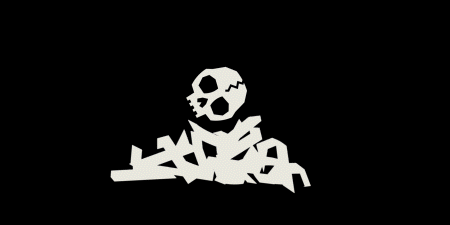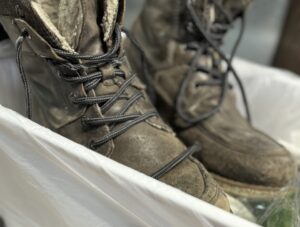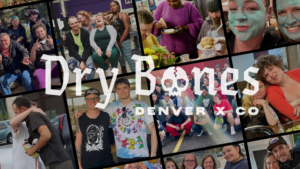Charles and Amanda attended a Dry Bones weekly Bible study at a home for about a year in 2007. A strong friendship was built between us over those months. This interview gives the couple’s perspective on becoming homeless, living on the streets, encountering good friends and eventually Christ there, and finally finding their way out.
I appreciate this interview each time I read it because it introduces us to one of hundreds of stories of how young people end up on the streets. Thanks to Charles and Amanda for boldly sharing your story with us.
Charles and Amanda have both been off of the streets since 2008. We are still in touch with Charles. Amanda – if you find this old interview, send us a message! We would love to hear from you.
Nikki: What was the chain of events that led to you being on the street?
Amanda: My mom and I got into a heated argument and my mom told me I had two choices to make and one of those choices was to pack up and leave or leave Charles and I wasn’t going to do the second one, so him and I said the only other choice is to leave.
Charles: We packed up even before she said to leave. We packed up everything we could and threw it out a second story window in the back and left.
Nikki: What has your relationship with your mom been like in the past?
Amanda: My relationship with my mom has always been stressful from the time I was like six on. With her working and not knowing what’s going on with me, and pots and pans being thrown at me, and just different things.
Nikki: Would you say that she was abusive?
Amanda: Physically, no, but emotionally, yes.
Nikki: Did you come straight to Downtown Denver?
Charles: We kind of piddled around (our suburb) for a few days. Then we went to the police for help but they wouldn’t lift a finger to help.
Amanda: (Our hometown) police are the type of police that don’t care, so we came downtown. The downtown police actually cared. There were cops that told me to keep warm.
Charles: One night (a guy) was messing with us. The police had us identify him and told us to wait right where we were because it was the warmest place; it was out of the wind. Then two hours later a security guard came by and boots us out with no reason. We told him that the police officer told us to stay there until it got warmer, until the next morning when we could leave.
Amanda: But I didn’t want to cause any drama or get in trouble. He could have arrested us. I didn’t know what he would do so we just left and walked the streets for six hours that night.
Charles: We walked down to The 16th Street Mall, slept on the Free Mall Ride for two hours until the driver told us to get off because he was taking the car back to the garage.
Amanda: And that’s when we found that there was a church that we could go to that might tell us where to go.
Charles: The day before we had gone to Trinity United Methodist Church and there were two weddings going on. One had just ended, one was about to start and the wedding coordinator knew of Jenny at Urban Peak [a shelter for homeless youth]. She called Urban Peak, and they told us to go to Urban Peak to get an intake. When we got there, a police officer was there which scared us. So we went to 7-Eleven where we met a guy who offered for us to stay at a motel room that he had. We stayed with him for a week, but he was really bossy so after that week we decided to go back to Urban Peak.
Nikki: So how did you feel during those three weeks on the streets?
Amanda: Scared…scared. We didn’t know anybody, we didn’t know where to turn, just really scared.
Charles: We had turned to the police to try to get hotel vouchers. They would do it for Amanda but not for me. The laws are crazy when it comes to the homeless.
Nikki: How long were you on the streets?
Charles: Three weeks.
Nikki: What was life like on the streets?
Amanda: We were scared of not knowing what was going on day to day.
Charles: Finding a place to sleep.
Amanda: We met some friends that said we should go to Urban Peak and that Urban Peak would be the best place for us to stay right now. And it kinda was. There was a lot of people who helped us in hard times.
Charles: While we were on the street, there were people telling us where to go and what to do during those three weeks. We were lucky we had the cell phone I had which saved our lives. We used it to call the police one night.
Nikki: Describe “the hard times.”
Amanda: Beating each other up, saying, “You caused this. Why are we here?” Just emotional beating up.
Nikki: What time of the year was it?
Amanda: October. It was getting colder. It hadn’t really snowed yet. But it was really cold. We didn’t have sweatshirts. We didn’t even have blankets.
Charles: We had thin jackets. We had all of our luggage.
Nikki: Describe some of the places you slept.
Amanda: A closet type thing, but not really. A parking garage. It was the exit to the underground parking garage. There were concrete blocks that came out on a ledge. We slept on that and tried to pass the time away by playing cards, reading, talking…
Charles: . . . trying to calm each other down, lift each other’s spirits. It was hard. For just people new to the streets, it was just hard.
Amanda: We didn’t know anybody. I didn’t know the state of Colorado well enough to be on my own, to be on the street. I just knew the Denver International Airport area. I knew how to get going wherever in that sense. But as far as getting downtown or Westminster Mall or whatever, I didn’t know.
Charles: The little money we had we spent on food.
Nikki: How did you get your money?
Charles: Left over money from my cash advance and a bit of left over money from the last job I had before I came out here.
Amanda: That caused us to have like $200. So it was like, eat and…
Charles: This one lady that was addicted to crack, smoked it, she let us spend over night in her apartment. Then, she stole $50 from my wallet.
Amanda: and a $100 from mine and that was the money that we were supposed to have to eat.
Nikki: So what did you do?
Amanda: What could we do? We left.
Charles: The lighters we had for any cigarettes we did have for me, she used up all of those. She spent all night smoking crack. She even ripped a lamp out of her wall and went down to sell it and buy a dime bag of crack.
Nikki: So what did help look like for you?
Amanda: The most useful help was Urban Peak. If it hadn’t been for the people we knew at Urban Peak, we would still be on the streets now. They gave us food, shelter, a place to sleep, tips to learn hygiene, case management. They did so much.
Nikki: What brought you into contact with Dry Bones?
Charles: Mandy (a girl that was attending the Monday night Bible study) told us that there was a Bible study that Dry Bones was doing and that there might be people that we could come to for advice. And the first time that we came to the Bible study it was like… I knew that there was so much help that you guys could offer spiritually that we couldn’t do by ourselves. And then after that first time we just constantly went. We just kept going.
Nikki: What brought you to the place in your life that you decided you needed a change?
Amanda: I knew that the street life wasn’t for me. I knew that if I wanted to be on the streets, I could still be on the streets. We needed a steady place to stay.
Charles: I didn’t want to worry about knowing where I’m going to sleep next, where I’m going to eat, and a million other things you have to worry about when you’re on the streets. Drugs, alcohol, it just wasn’t a life I could live. It wasn’t the life I was raised to live. I was raised in a happy home. When I was back at home, I thought…homeless…I’ll never be homeless. And then when it hit me that I was homeless, I was shocked. I decided that we had to find help somewhere and we’ve got to do it now. So we made that extra effort to have my cell phone there with us so that we could call if we needed help. We ate a couple meals at the Denver Rescue Mission. We tried to get into the Samaritan House but they were full. A lot has happened since we hit the streets.
Amanda: I was getting so stressed at Urban Peak. So Jenny put me into a room by myself with a pen and paper and told me to write my thoughts. When I started writing my thoughts it turned into poetry.
Nikki: What brought you to spiritual change in your life?
Amanda: I knew I had to do something with my life and I had that grasp of “You need to either sit down and talk to God about this or you need to close up.” I didn’t want to close up so one night I knelt down and I said “If there’s another way, show me.” And God showed me by bringing us to the Catholic Worker House [where they were living at the time of this interview], keeping us fed, keeping us clean, and just making sure we were safe.
Nikki: What did Christ have to do with your decision to change?
Amanda: Every time I’d go to sleep…You know that feeling of someone watching you but you can’t see it…He would be like you need to wake up, you are in trouble. So I knew that He was watching and that He was there. He was pushing me.
Nikki: What are your vision and goals for yourself over the next few months to a year?
Amanda: Getting an apartment and having a healthy kid (Amanda is four months pregnant).
Charles: Finding steady work. That’s been the biggest thing right now.
Nikki: What has been your spiritual journey since you’ve been on the streets?
Amanda: Trying to find God. I’ve explored witchcraft, I’ve done Wicca; I’ve tried it all. But they were never satisfying to me. There is power in witchcraft, there is power in Wicca, but there is so much more power and Love in Christianity. I’m following God now, not anything I’ve ever tried in the past. I’m following God and the Bible. If I have any questions, I go to God or to a pastor. I don’t follow all these different pathways because that is what the devil is trying to get me to do. There’s just not enough love and power in Wicca or witchcraft that can satisfy my need.
Charles: God was the only one I followed. I may have fallen away from Him, but I have always put my trust in Him.
Nikki: Is there anything else that you want to share?
Amanda: People don’t understand. It’s just trying so hard to get off of the streets, to pick yourself up, to say, “Look there is another way, you’ve just got to do it.” No one is going to do it for you.
Charles: You have to find that help on your own, but once you find it you have to let people help you.
Amanda: Dry Bones gave me assurance that there is spiritual help out there and knowledge that if something goes wrong, you can look to a higher power and ask for help. God’s not going to take a look at you and turn the other way. And that’s what Dry Bones has not done is look at people on the streets and turned the other way. Street kids can always call; they always have the staffs’ phone number. No matter who they are or what their religion is, Dry Bones has not turned their back on people. They don’t push the Bible down people’s throat like [another church]. Dry Bones knows that they are working with people from Christians to Wiccans. There’s a huge difference there, and Dry Bones did not turn their back on any of these people. And that is what I like about Dry Bones is you can connect or just get away from day to day life but be your own self. You don’t have to hide things from the Dry Bones people. They don’t preach down your throat. You guys never turned your back on us. That’s why I respect Dry Bones and what they’re doing, because it’s not another church and it’s not another youth group. That’s why I always go to Bible study every Monday.
Charles: Being a Christian has been hard all my life. Knowing people that are Wicca or pagan or into witchcraft. I was always persecuted. I came out here and wanted to find a church or people I could relate to, spend time with, be with, make friends with and Dry Bones has done that. They relate to our generation. It’s not like any other church I’ve ever been to. Dry Bones is about God and love. They love everyone.




